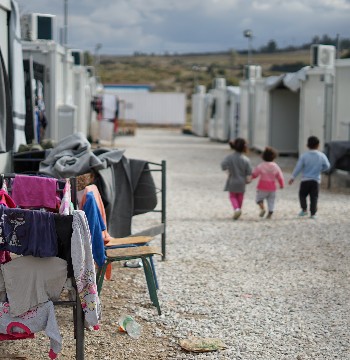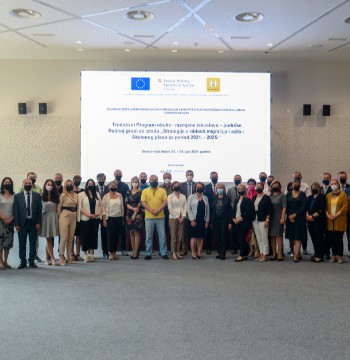Balkan Route: better coordination with Austrian aid

Hilfswerk International promotes cooperation of migration-related structures in the Western Balkans
At the gates of the European Union, one topic is particularly explosive: migration. On the Western Balkans route, however, migration cooperation among states is in need of improvement. With funding from the Asylum, Migration and Integration Fund and the Federal Ministry of the Interior, Hilfswerk International is promoting better coordination, networking and agreement between migration-relevant structures in Bosnia and Herzegovina, Serbia, North Macedonia and Montenegro in a new project.
Hardly any coordinated action
Cooperation between border and security authorities and migration-related institutions in the Western Balkans is proving difficult, with hardly any coordinated action. This current weak mutual connection between the countries has far-reaching implications for people fleeing and irregular migration to the European Union.
"The 4 countries Bosnia and Herzegovina, Serbia, North Macedonia and Montenegro are located in the middle of the Balkan route. These transit countries often lack capacities to deal with migration in a targeted and, above all, joint manner. This favors people smugglers, and once in the destination country, migrants' expectations are often not met," knows long-time Hilfswerk International Regional Director for Balkans, Suzana Jašarević.
Strengthening long-term cooperation
“We have developed a concept that focuses on intensive capacity building for migration-related structures," Jašarević continues. From 01.03.2021 to 28.02.2022, a total of 2,980 people in migration-relevant structures are to be reached through 28 capacity-building measures.
The project will focus on
- The development of a regional implementation plan for dealing with migration,
- overcoming language barriers between border officials and with people on the move, and
- the networking of different stakeholders from the four countries (authorities, ministries, organizations, police, security services).
"Cooperation between the countries in the Western Balkans is challenging in many policy areas. We expect this project to finally address the issue of migration together. With this, we could prevent a lot of suffering," Jašarević said.



